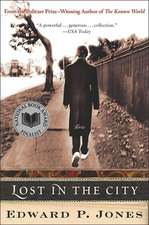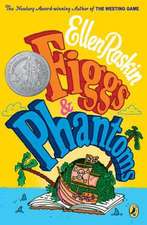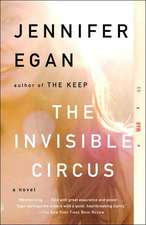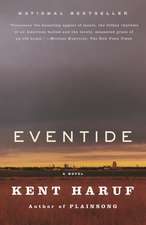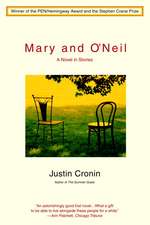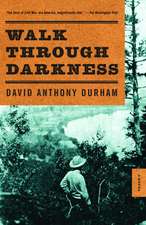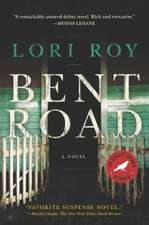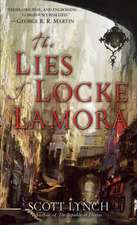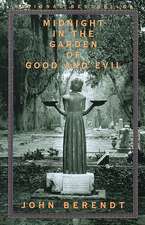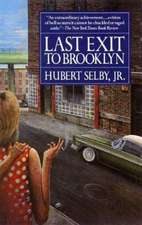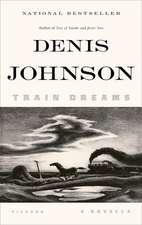Plainsong: Vintage Contemporaries
Autor Kent Harufen Limba Engleză Paperback – 31 iul 2000 – vârsta de la 14 până la 18 ani
Vezi toate premiile Carte premiată
L.A. Times Book Prize (1999)
-FROM THE CITATION FOR THE NATIONAL BOOK AWARD
| Toate formatele și edițiile | Preț | Express |
|---|---|---|
| Paperback (3) | 43.18 lei 3-5 săpt. | |
| Pan Macmillan – 11 apr 2013 | 43.18 lei 3-5 săpt. | |
| Pan Macmillan – 2025 | 47.41 lei 3-5 săpt. | +31.26 lei 6-12 zile |
| Vintage Books USA – 31 iul 2000 | 96.52 lei 3-5 săpt. |
Din seria Vintage Contemporaries
-
 Preț: 109.95 lei
Preț: 109.95 lei -
 Preț: 101.80 lei
Preț: 101.80 lei -
 Preț: 107.46 lei
Preț: 107.46 lei -
 Preț: 91.77 lei
Preț: 91.77 lei -
 Preț: 100.35 lei
Preț: 100.35 lei -
 Preț: 111.51 lei
Preț: 111.51 lei -
 Preț: 96.11 lei
Preț: 96.11 lei -
 Preț: 96.93 lei
Preț: 96.93 lei -
 Preț: 97.34 lei
Preț: 97.34 lei -
 Preț: 111.92 lei
Preț: 111.92 lei -
 Preț: 117.87 lei
Preț: 117.87 lei -
 Preț: 95.92 lei
Preț: 95.92 lei -
 Preț: 113.56 lei
Preț: 113.56 lei -
 Preț: 101.88 lei
Preț: 101.88 lei -
 Preț: 108.09 lei
Preț: 108.09 lei -
 Preț: 115.42 lei
Preț: 115.42 lei -
 Preț: 106.04 lei
Preț: 106.04 lei -
 Preț: 119.87 lei
Preț: 119.87 lei -
 Preț: 90.64 lei
Preț: 90.64 lei -
 Preț: 87.84 lei
Preț: 87.84 lei -
 Preț: 99.51 lei
Preț: 99.51 lei -
 Preț: 105.41 lei
Preț: 105.41 lei -
 Preț: 99.30 lei
Preț: 99.30 lei -
 Preț: 120.26 lei
Preț: 120.26 lei -
 Preț: 103.74 lei
Preț: 103.74 lei -
 Preț: 100.98 lei
Preț: 100.98 lei -
 Preț: 100.76 lei
Preț: 100.76 lei -
 Preț: 89.19 lei
Preț: 89.19 lei -
 Preț: 115.94 lei
Preț: 115.94 lei -
 Preț: 101.24 lei
Preț: 101.24 lei -
 Preț: 125.13 lei
Preț: 125.13 lei -
 Preț: 89.50 lei
Preț: 89.50 lei -
 Preț: 132.88 lei
Preț: 132.88 lei -
 Preț: 139.63 lei
Preț: 139.63 lei -
 Preț: 93.85 lei
Preț: 93.85 lei -
 Preț: 106.45 lei
Preț: 106.45 lei -
 Preț: 89.91 lei
Preț: 89.91 lei -
 Preț: 107.92 lei
Preț: 107.92 lei -
 Preț: 77.02 lei
Preț: 77.02 lei -
 Preț: 125.21 lei
Preț: 125.21 lei -
 Preț: 99.75 lei
Preț: 99.75 lei -
 Preț: 112.11 lei
Preț: 112.11 lei -
 Preț: 83.94 lei
Preț: 83.94 lei -
 Preț: 97.15 lei
Preț: 97.15 lei -
 Preț: 105.82 lei
Preț: 105.82 lei -
 Preț: 87.13 lei
Preț: 87.13 lei -
 Preț: 111.76 lei
Preț: 111.76 lei -
 Preț: 129.78 lei
Preț: 129.78 lei -
 Preț: 100.57 lei
Preț: 100.57 lei
Preț: 96.52 lei
Nou
Puncte Express: 145
Preț estimativ în valută:
18.47€ • 19.75$ • 15.40£
18.47€ • 19.75$ • 15.40£
Carte disponibilă
Livrare economică 28 martie-11 aprilie
Preluare comenzi: 021 569.72.76
Specificații
ISBN-13: 9780375705854
ISBN-10: 0375705856
Pagini: 320
Dimensiuni: 137 x 203 x 18 mm
Greutate: 0.25 kg
Editura: Vintage Books USA
Seria Vintage Contemporaries
ISBN-10: 0375705856
Pagini: 320
Dimensiuni: 137 x 203 x 18 mm
Greutate: 0.25 kg
Editura: Vintage Books USA
Seria Vintage Contemporaries
Notă biografică
KENT HARUFis the author of five previous novels (and, with the photographer Peter Brown,West of Last Chance). His honors include a Whiting Foundation Writers’ Award, the Mountains & Plains Booksellers Award, the Wallace Stegner Award, and a special citation from the PEN/Hemingway Foundation; he was also a finalist for the National Book Award, the Los Angeles Times Book Prize, and the New Yorker Book Award. He died in November 2014, at the age of seventy-one.
Extras
Here was this man Tom Guthrie in Holt standing at the back window in the kitchen of his house smoking cigarettes and looking out over the back lot where the sun was just coming up. When the sun reached the top of the windmill, for a while he watched what it was doing, that increased reddening of sunrise along the steel blades and the tail vane above the wooden platform. After a time he put out the cigarette and went upstairs and walked past the closed door behind which she lay in bed in the darkened guest room sleeping or not and went down the hall to the glassy room over the kitchen where the two boys were.
The room was an old sleeping porch with uncurtained windows on three sides, airy-looking and open, with a pinewood floor. Across the way they were still asleep, together in the same bed under the north windows, cuddled up, although it was still early fall and not yet cold. They had been sleeping in the same bed for the past month and now the older boy had one hand stretched above his brother's head as if he hoped to shove something away and thereby save them both. They were nine and ten, with dark brown hair and unmarked faces, and cheeks that were still as pure and dear as a girl's.
Outside the house the wind came up suddenly out of the west and the tail vane turned with it and the blades of the windmill spun in a red whir, then the wind died down and the blades slowed and stopped.
You boys better come on, Guthrie said.
He watched their faces, standing at the foot of the bed in his bathrobe. A tall man with thinning black hair, wearing glasses. The older boy drew back his hand and they settled deeper under the cover. One of them sighed comfortably.
Ike.
What?
Come on now.
We are.
You too, Bobby.
He looked out the window. The sun was higher, the light beginning to slide down the ladder of the windmill, brightening it, making rungs of rose-gold.
When he turned again to the bed he saw by the change in their faces that they were awake now. He went out into the hall again past the closed door and on into the bathroom and shaved and rinsed his face and went back to the bedroom at the front of the house whose high windows overlooked Railroad Street and brought out shirt and pants from the closet and laid them out on the bed and took off his robe and got dressed. When he returned to the hallway he could hear them talking in their room, their voices thin and clear, already discussing something, first one then the other, intermittent, the early morning matter-of-fact voices of little boys out of the presence of adults. He went downstairs.
Ten minutes later when they entered the kitchen he was standing at the gas stove stirring eggs in a black cast-iron skillet. He turned to look at them. They sat down at the wood table by the window.
Didn't you boys hear the train this morning?
Yes, Ike said.
You should have gotten up then.
Well, Bobby said. We were tired.
That's because you don't go to bed at night.
We go to bed.
But you don't go to sleep. I can hear you back there talking and fooling around.
They watched their father out of identical blue eyes. Though there was a year between them they might have been twins. They'd put on blue jeans and flannel shirts and their dark hair was uncombed and fallen identically over their unmarked foreheads. They sat waiting for breakfast and appeared to be only half awake.
Guthrie brought two thick crockery plates of steaming eggs and buttered toast to the table and set them down and the boys spread jelly on the toast and began to eat at once, automatically, chewing, leaning forward over their plates. He carried two glasses of milk to the table.
He stood over the table watching them eat. I have to go to school early this morning, he said. I'll be leaving in a minute.
Aren't you going to eat breakfast with us? Ike said. He stopped chewing momentarily and looked up.
I can't this morning. He recrossed the room and set the skillet in the sink and ran water into it.
Why do you have to go to school so early?
I have to see Lloyd Crowder about somebody.
Who is it?
A boy in American history.
What'd he do? Bobby said. Look off somebody's paper?
Not yet. I don't doubt that'll be next, the way he's going.
Ike picked at something in his eggs and put it at the rim of his plate. He looked up again. But Dad, he said.
What.
Isn't Mother coming down today either?
I don't know, Guthrie said. I can't say what she'll do. But you shouldn't worry. Try not to. It'll be all right. It doesn't have anything to do with you.
He looked at them closely. They had stopped eating altogether and were staring out the window toward the barn and corral where the two horses were.
You better go on, he said. By the time you get done with your papers you'll be late for school.
He went upstairs once more. In the bedroom he removed a sweater from the chest of drawers and put it on and went down the hall and stopped in front of the closed door. He stood listening but there was no sound from inside. When he stepped into the room it was almost dark, with a feeling of being hushed and forbidding as in the sanctuary of an empty church after the funeral of a woman who had died too soon, a sudden impression of static air and unnatural quiet. The shades on the two windows were drawn down completely to the sill. He stood looking at her. Ella. Who lay in the bed with her eyes closed. He could just make out her face in the halflight, her face as pale as schoolhouse chalk and her fair hair massed and untended, fallen over her cheeks and thin neck, hiding that much of her. Looking at her, he couldn't say if she was asleep or not, but he believed she was not. He believed she was only waiting to hear what he had come in for, and then for him to leave.
Do you want anything? he said.
She didn't bother to open her eyes. He waited. He looked around the room. She had not yet changed the chrysanthemums in the vase on the chest of drawers and there was an odor rising from the stale water in the vase. He wondered that she didn't smell it. What was she thinking about.
Then I'll see you tonight, he said.
He waited. There was still no movement.
All right, he said. He stepped back into the hall and pulled the door shut and went on down the stairs.
As soon as he was gone she turned in the bed and looked toward the door. Her eyes were intense, wide-awake, outsized. After a moment she turned again in the bed and studied the two thin pencils of light shining in at the edge of the window shade. There were fine dust motes swimming in the dimly lighted air like tiny creatures underwater, but in a moment she closed her eyes again. She folded her arm across her face and lay unmoving as though asleep.
Downstairs, passing through the house, Guthrie could hear the two boys talking in the kitchen, their voices clear, high-pitched, animated again. He stopped for a minute to listen. Something to do with school. Some boy saying this and this too and another one, the other boy, saying it wasn't any of that either because he knew better, on the gravel playground out back of school. He went outside across the porch and across the drive toward the pickup. A faded red Dodge with a deep dent in the left rear fender. The weather was clear, the day was bright and still early and the air felt fresh and sharp, and Guthrie had a brief feeling of uplift and hopefulness. He took a cigarette from his pocket and lit it and stood for a moment looking at the silver poplar tree. Then he got into the pickup and cranked it and drove out of the drive onto Railroad Street and headed up the five or six blocks toward Main. Behind him the pickup lifted a powdery plume from the road and the suspended dust shone like bright flecks of gold in the sun.
The room was an old sleeping porch with uncurtained windows on three sides, airy-looking and open, with a pinewood floor. Across the way they were still asleep, together in the same bed under the north windows, cuddled up, although it was still early fall and not yet cold. They had been sleeping in the same bed for the past month and now the older boy had one hand stretched above his brother's head as if he hoped to shove something away and thereby save them both. They were nine and ten, with dark brown hair and unmarked faces, and cheeks that were still as pure and dear as a girl's.
Outside the house the wind came up suddenly out of the west and the tail vane turned with it and the blades of the windmill spun in a red whir, then the wind died down and the blades slowed and stopped.
You boys better come on, Guthrie said.
He watched their faces, standing at the foot of the bed in his bathrobe. A tall man with thinning black hair, wearing glasses. The older boy drew back his hand and they settled deeper under the cover. One of them sighed comfortably.
Ike.
What?
Come on now.
We are.
You too, Bobby.
He looked out the window. The sun was higher, the light beginning to slide down the ladder of the windmill, brightening it, making rungs of rose-gold.
When he turned again to the bed he saw by the change in their faces that they were awake now. He went out into the hall again past the closed door and on into the bathroom and shaved and rinsed his face and went back to the bedroom at the front of the house whose high windows overlooked Railroad Street and brought out shirt and pants from the closet and laid them out on the bed and took off his robe and got dressed. When he returned to the hallway he could hear them talking in their room, their voices thin and clear, already discussing something, first one then the other, intermittent, the early morning matter-of-fact voices of little boys out of the presence of adults. He went downstairs.
Ten minutes later when they entered the kitchen he was standing at the gas stove stirring eggs in a black cast-iron skillet. He turned to look at them. They sat down at the wood table by the window.
Didn't you boys hear the train this morning?
Yes, Ike said.
You should have gotten up then.
Well, Bobby said. We were tired.
That's because you don't go to bed at night.
We go to bed.
But you don't go to sleep. I can hear you back there talking and fooling around.
They watched their father out of identical blue eyes. Though there was a year between them they might have been twins. They'd put on blue jeans and flannel shirts and their dark hair was uncombed and fallen identically over their unmarked foreheads. They sat waiting for breakfast and appeared to be only half awake.
Guthrie brought two thick crockery plates of steaming eggs and buttered toast to the table and set them down and the boys spread jelly on the toast and began to eat at once, automatically, chewing, leaning forward over their plates. He carried two glasses of milk to the table.
He stood over the table watching them eat. I have to go to school early this morning, he said. I'll be leaving in a minute.
Aren't you going to eat breakfast with us? Ike said. He stopped chewing momentarily and looked up.
I can't this morning. He recrossed the room and set the skillet in the sink and ran water into it.
Why do you have to go to school so early?
I have to see Lloyd Crowder about somebody.
Who is it?
A boy in American history.
What'd he do? Bobby said. Look off somebody's paper?
Not yet. I don't doubt that'll be next, the way he's going.
Ike picked at something in his eggs and put it at the rim of his plate. He looked up again. But Dad, he said.
What.
Isn't Mother coming down today either?
I don't know, Guthrie said. I can't say what she'll do. But you shouldn't worry. Try not to. It'll be all right. It doesn't have anything to do with you.
He looked at them closely. They had stopped eating altogether and were staring out the window toward the barn and corral where the two horses were.
You better go on, he said. By the time you get done with your papers you'll be late for school.
He went upstairs once more. In the bedroom he removed a sweater from the chest of drawers and put it on and went down the hall and stopped in front of the closed door. He stood listening but there was no sound from inside. When he stepped into the room it was almost dark, with a feeling of being hushed and forbidding as in the sanctuary of an empty church after the funeral of a woman who had died too soon, a sudden impression of static air and unnatural quiet. The shades on the two windows were drawn down completely to the sill. He stood looking at her. Ella. Who lay in the bed with her eyes closed. He could just make out her face in the halflight, her face as pale as schoolhouse chalk and her fair hair massed and untended, fallen over her cheeks and thin neck, hiding that much of her. Looking at her, he couldn't say if she was asleep or not, but he believed she was not. He believed she was only waiting to hear what he had come in for, and then for him to leave.
Do you want anything? he said.
She didn't bother to open her eyes. He waited. He looked around the room. She had not yet changed the chrysanthemums in the vase on the chest of drawers and there was an odor rising from the stale water in the vase. He wondered that she didn't smell it. What was she thinking about.
Then I'll see you tonight, he said.
He waited. There was still no movement.
All right, he said. He stepped back into the hall and pulled the door shut and went on down the stairs.
As soon as he was gone she turned in the bed and looked toward the door. Her eyes were intense, wide-awake, outsized. After a moment she turned again in the bed and studied the two thin pencils of light shining in at the edge of the window shade. There were fine dust motes swimming in the dimly lighted air like tiny creatures underwater, but in a moment she closed her eyes again. She folded her arm across her face and lay unmoving as though asleep.
Downstairs, passing through the house, Guthrie could hear the two boys talking in the kitchen, their voices clear, high-pitched, animated again. He stopped for a minute to listen. Something to do with school. Some boy saying this and this too and another one, the other boy, saying it wasn't any of that either because he knew better, on the gravel playground out back of school. He went outside across the porch and across the drive toward the pickup. A faded red Dodge with a deep dent in the left rear fender. The weather was clear, the day was bright and still early and the air felt fresh and sharp, and Guthrie had a brief feeling of uplift and hopefulness. He took a cigarette from his pocket and lit it and stood for a moment looking at the silver poplar tree. Then he got into the pickup and cranked it and drove out of the drive onto Railroad Street and headed up the five or six blocks toward Main. Behind him the pickup lifted a powdery plume from the road and the suspended dust shone like bright flecks of gold in the sun.
Recenzii
"A novel so foursquare, so delicate and lovely . . . it has the power to exalt the reader." --The New York Times Book Review
"Resonant and meaningful . . . . A song of praise in honor of the lives it chronicles [and] a story about people's ability to adapt and redeem themselves, to heal the wounds of isolation by moving, gropingly and imperfectly, toward community." --Richard Tillinghast, The Washington Post Book World
"A compelling and compassionate novel. . . . [With] his sheer assurance as a storyteller, [Mr. Haruf] has conjured up an entire community, and ineluctably immersed the reader in its dramas." --Michiko Kakutani, The New York Times
"A work as flawlessly unified as a short story by Poe or Chekhov." --Jon Hassler, Chicago Tribune
"Haunting, virtuosic, inimitable." --Sarah Saffian, San Francisco Chronicle
"If the novelist invents a world, then Mr. Haruf has shaped a place of enormous goodness... The story itself--spare, unsentimental, rooted in action--honors the values of the community it describes." --Lisa Michaels,
"A moving look at our capacity for both pointless cruelty and simple decency, our ability to walk out of the wreckage of one family and build a stronger one where that one used to stand." --Jeff Giles, Newsweek
"A work as flawlessly unified as a short story by Poe or Chekhov." --Jon Hassler, Chicago Tribune
"Resonant and meaningful . . . . A song of praise in honor of the lives it chronicles [and] a story about people's ability to adapt and redeem themselves, to heal the wounds of isolation by moving, gropingly and imperfectly, toward community." --Richard Tillinghast, The Washington Post Book World
"A compelling and compassionate novel. . . . [With] his sheer assurance as a storyteller, [Mr. Haruf] has conjured up an entire community, and ineluctably immersed the reader in its dramas." --Michiko Kakutani, The New York Times
"A work as flawlessly unified as a short story by Poe or Chekhov." --Jon Hassler, Chicago Tribune
"Haunting, virtuosic, inimitable." --Sarah Saffian, San Francisco Chronicle
"If the novelist invents a world, then Mr. Haruf has shaped a place of enormous goodness... The story itself--spare, unsentimental, rooted in action--honors the values of the community it describes." --Lisa Michaels,
"A moving look at our capacity for both pointless cruelty and simple decency, our ability to walk out of the wreckage of one family and build a stronger one where that one used to stand." --Jeff Giles, Newsweek
"A work as flawlessly unified as a short story by Poe or Chekhov." --Jon Hassler, Chicago Tribune
Descriere
From the unsettled lives of three people emerges a vision of life, and of the town and landscape that bind them together. Utterly true to the rhythms and patterns of life, "Plainsong" is a heartfelt story of family and romance, tribulation, and tenacity. "A novel so foursquare, so delicate and lovely, that it has the power to exalt the reader".--Verlyn Klinkenborg, "The New York Times Book Review".
Premii
- L.A. Times Book Prize Nominee, 1999

